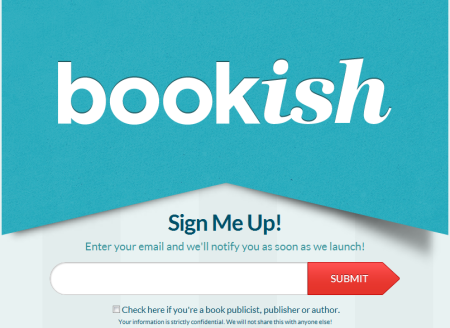As an advocate of community-oriented publishing (and marketing), I’m a big fan of publisher initiatives like Macmillan’s Tor.com, Criminal Element and Work in Progress; F+W’s recently announced acquisition of Tyrus Books and launch of F+W Crime; and to a lesser degree (conceptually at least), Random House’s Word and Film. Many other publishers have become more savvy about engaging with existing communities of readers on Facebook, Twitter and Goodreads, with Atomic Fez Publishing being one of the more intriguing examples.
Of course, last week’s much hyped and completely vague announcement of Bookish, a new joint venture between three of the “Big 6″ – Hachette Book Group, Simon & Schuster, and Penguin Group — caught my attention, not for its unusual (but not unprecedented) collaborative angle, but for its disappointingly unimaginative and shortsighted value proposition:
[Penguin Group USA CEO David Shanks] said the three publishers came together after it became clear that their individual sites would never drive enough traffic to reach a critical mass of book buyers. As print media devotes less space to book coverage, the publishers felt they needed a way to raise the profile of their content, Shanks said.
Peter Fader, Professor of Marketing and Co-Director – Wharton Customer Analytics Initiative, is skeptical, noting one of the major challenges Bookish faces is lack of consumer demand:
[T]he initiative will require “a massive top-down marketing push. There is no existing groundswell of interest. It would be better if the publishers had a competition and told entrepreneurs to build an online one-stop shopping book world, because right now [the publishers] are not capable of creating the right kind of buzz themselves.”
Fader is simultaneously right and wrong. While there is no “groundswell of interest” for Bookish itself, he’s wrong that there’s no demand for the underlying concept, as it effectively occupies the no man’s land between Amazon and Goodreads, the yin and yang of the commerce vs. community conundrum.
As Carolyn Kellogg noted at the L.A. Times‘ Jacket Copy, “[Bookish] sounds a little like Goodreads. But Goodreads is about community first, book-selling second — while Bookish seems to be the other way around.”
And therein lies my main concern: Bookish solves a problem that only exists for publishers, not readers.
COMMUNITY OR COMMERCE?
Amazon is the 800-pound gorilla in online book sales and they have a variety of under-the-radar community-esque initiatives, including targeted blogs and publishing imprints, not to mention the ability to do the kind of targeted marketing that no publisher will ever be able to match. Also, Wall Street is finally acknowledging Barnes & Noble’s ability to compete digitally, so Bookish’s SWOT analysis on the commerce side isn’t pretty, heavy on the Weaknesses and Threats.
Meanwhile, on the community side, Goodreads is on the verge of signing up its 5-millionth member and recently acquired Discovereads, a “taste engine” that will offer recommendations based on the books users have read and rated, which is exactly what Bookish claims it will offer its non-existent users when it launches. Goodreads is also a publisher-, retailer-and format-agnostic platform that puts community first while enabling multiple revenue streams, from affiliate sales through a variety of retailers, numerous marketing angles for publisher partners (and individual authors), and most recently, direct sales of DRM-free ebooks.
How can a publisher-driven initiative that, PR spin aside, is undoubtedly focused on commerce first possibly compete in this space, especially one that’s making one of the biggest mistakes so many other similar ventures have made, staffing up with expensive executives before a single dollar has been made?
What angle can they offer readers that isn’t available on more established ecommerce sites with existing customer relationships?
And, perhaps the toughest question of them all, are they willing and able to compete with Amazon, on price, undercutting indie booksellers in the process?
Bookish isn’t doomed to failure by any stretch, but as Fader notes, if publishers can’t effectively promote their own books via existing sales and marketing channels, how can they possibly hope to effectively promote a reader-centric website that will have to compete with those channels?
The post Bookish vs. Amazon, Goodreads: Community or Commerce? appeared first on Guy LeCharles Gonzalez.
